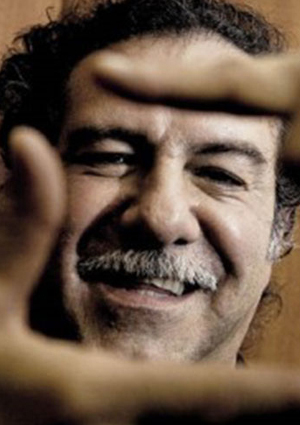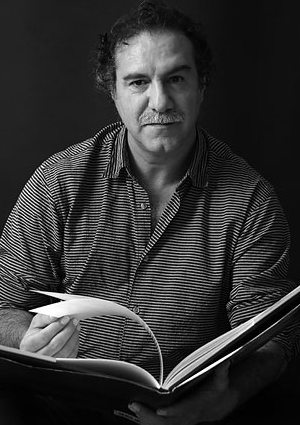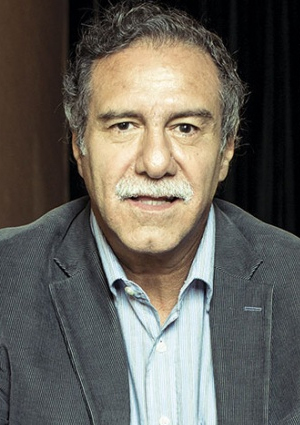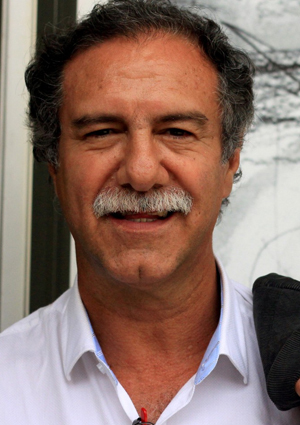Director, Executive Producer, Otros, Screenplay, Edition, Screenplay Consultant, Camera, Actor / Actress
Victor Gaviria
Víctor Manuel Gaviria, born in Medellin, has served as a director, screenwriter, poet, and author. His films have won numerous international accolades and have been selected for some of the most prestigious festivals in the world, including Cannes and the San Sebastian Film Festival. Gaviria studied psychology at the University of Antioquia because he “wanted to feel the soul of words.” He also wrote poetry, and published Con los que viajo sueño (1978) and won the Eduardo Cote Lamus National Poetry Contest (1978) for Alguien en la ciudad también perplejo. At age 25, he won the Universidad de Antioquia National Poetry Prize for La luna y la ducha fría (1979). He began to explore other genres to express the same questions about everyday metaphysics, leading him to write the poetic essay El campo al fin de cuentas no es tan verde (1983). In 1986, he collected selections of his poetry, essays, and screenplays in the anthology El pulso del cartógrafo. His later projects include El rey de los espantos (1993), scripts, other books of poetry, and films.
In 1979, Gaviria’s short film Buscando tréboles won the Super 8 del Subterráneo film competition and the Colcultura Búho Award. The following year, he once again won the Colcutura film award with La lupa del fin del mundo. From 1979 to 1985, he made one short or feature film each year. His film credits include Sueño sobre un mantel vacío (1981); El vagón rojo (1982); Los habitantes de la noche (1983), winner of the India Catalina award at the 25th Cartagena Film Festival; Primavera sobre José Asunción Silva (1983); La vieja guardia (1984); Que pase el aserrador (1985); El tren de las niñas (1985); and Los músicos (1986).
Gaviria’s film Rodrigo D: No Future (1990) won him the Focine Screenplay Award and an invitation to the Official Selection of the Cannes Film Festival. Following this success, he wrote the documentary Historias de Aranjuez and made the film Simón el mago (1992). And with his film The Rose Seller (1996-1998), one of the most award-winning films in the history of Colombian cinema, Gaviria once again participated in the Official Selection of the Cannes Film Festival. The Rose Seller also won best film awards at film festivals in San Juan (Puerto Rico), Denver, Santa Cruz, and Slovakia. His documentary Polizones en Nueva Colonia (1991) received the Simon Bolivar Journalism Award in the television category.
Gaviria’s next film, Additions and Subtractions (2001-2004), won the Garza de Oro award for best picture and the award for best actor at the ninth Miami Latino Film Festival. At the Cartagena Film Festival, it won awards for Best Director, Best Film, and Best Supporting Actor (Fabio Restrepo). It also received the Best Ibero-American Film Award from the Mexican Academy of Motion Picture Arts and Sciences (ALMA), and it won the Grand Prix for best South American film and the Grand Prix for best actor at the Toulouse Latin American Film Festival.
In 2009, Gaviria was granted the Colombian Ministry of Culture’s Medal of Cultural Achievement. The Medal recognized Gaviria’s accomplishments, his contributions to Colombian and Latin American cinema throughout his career, and his place as an icon of contemporary cinema. Also in 2009, the 24th Guadalajara International Film Festival in Mexico paid a special tribute to Gaviria. And in March of the same year, the Bogota Cinematheque presented a retrospective of his films that kicked off by launching the book Víctor Gaviria: 30 años de vida fílmica–Retrospectiva integral.
In November 2016, he received a Lifetime Achievement Award at the fifth Macondo Awards, granted by the Colombian Academy of Film Arts and Sciences (ACACC) in recognition of his 37 years of work to advance Colombian cinema.
His fourth feature film, The Animal's Wife, had its world premiere at the 41st Toronto International Film Festival (TIFF), and went on to participate in the Rome Film Festival, the 8th FICCALI, and the 32nd Guadalajara International Film Festival in Mexico. The production won the Coral Prize for Best Director and a Special Mention for Female Performance at the 38th Festival of New Latin American Cinema in Havana, Cuba; the Silver Biznaga for Best Director and the Silver Biznaga for Best Editing, awarded to Etienne Boussac, at the 20th Malaga Spanish Language Film Festival; the Movistar Award for Best Feature Film; the La Caixa Obra Social award for Best Director; the Casa América Cataluña award for Best Screenplay; the Radio Exterior de España Award; and the Audience Award at the 23rd Latin American Film Screening of Catalonia.
The director had this to say about The Animal’s Wife: “My earlier films have been a series of episodes that formed a universe. So when I learned of the existence of the Animal and his wife, I thought that the force of hate that pervades the story from beginning to end could give this film a continuous, electrifying unity that I had never experienced. From start to finish, the non-professional actors and their performances, as they always do, would reveal a powerful current of resentment throbbing in episodes of everyday life. Beyond psychology, the body of Evil appears as the vision of an everyday life distorted by horrifying, enraged movements. These are the movements of radical Evil. They are part of myth, not psychology; they are the marks that Evil leaves on everyday life. They are the marks left by its ominous presence. This film seeks to reveal them.”
Víctor Gaviria also founded and directed the Santa Fe de Antioquia Film Festival, and he is currently director of the Jardin, Antioquia Film Festival, which held its first edition in July 2016. Gaviria has several projects in development, including the feature film Latinos, winner of the TVE Award at the Fourth International Film Co-Production Meeting of the Guadalajara Film Festival in 2008; La muchacha del ascensor, which won a grant of US$11,000 from the Ibermedia Program fund in 2005; and the feature film project La hora de los traidores, winner of an FDC incentive award in 2007.
Last updated: April 2017.
Filming
Director
THE ANIMAL'S WIFE (2017)
Director
ADDICTIONS AND SUBTRACTIONS (2004)
Director
LA VENDEDORA DE ROSAS (1998)
Director
RODRIGO D NO FUTURO (1990)
Director
LOS MÚSICOS (1986)
Director
LA VIEJA GUARDIA (1985)
Director
LOS HABITANTES DE LA NOCHE (1984)
Director
QUE PASE EL ASERRADOR (1984)
Director
SUEÑO SOBRE UN MANTEL VACÍO (1981)
Director
BUSCANDO TRÉBOLES (1980)
Executive Producer
THE ANIMAL'S WIFE (2017)
Otros
Screenplay
THE ANIMAL'S WIFE (2017)
Screenplay
ADDICTIONS AND SUBTRACTIONS (2004)
Screenplay
LA VENDEDORA DE ROSAS (1998)
Screenplay
RODRIGO D NO FUTURO (1990)
Screenplay
LOS MÚSICOS (1986)
Screenplay
LA VIEJA GUARDIA (1985)
Screenplay
LOS HABITANTES DE LA NOCHE (1984)
Screenplay
QUE PASE EL ASERRADOR (1984)
Screenplay
SUEÑO SOBRE UN MANTEL VACÍO (1981)
Screenplay
BUSCANDO TRÉBOLES (1980)
Edition
SUEÑO SOBRE UN MANTEL VACÍO (1981)
Edition
BUSCANDO TRÉBOLES (1980)
Screenplay Consultant
INFIERNO O PARAÍSO (2014)
Camera
PONER A ACTUAR PÁJAROS: 20 AÑOS DESPUÉS DE LA VENDEDORA DE ROSAS (2017)
Actor / Actress
ANHELL69 (2023)
Actor / Actress
Actor / Actress
PONER A ACTUAR PÁJAROS: 20 AÑOS DESPUÉS DE LA VENDEDORA DE ROSAS (2017)








